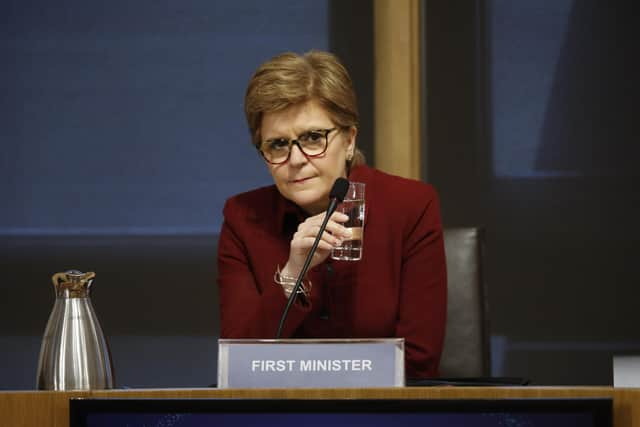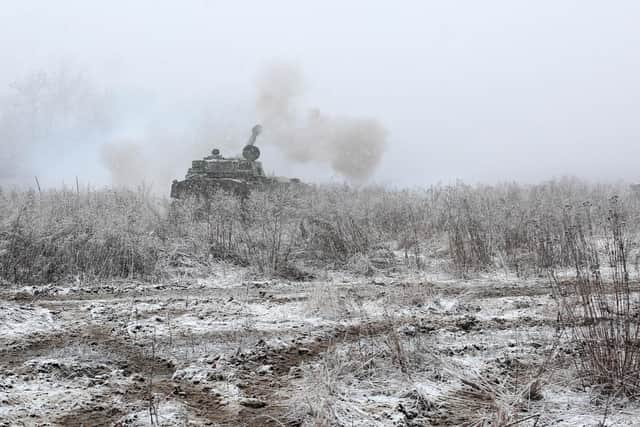With Ukraine in mind, the SNP needs a plan for a post-independence military - Marcel Plichta
From First Minister Sturgeon’s immediate call for severe sanctions on Russia to Ian Blackford’s protestations about a private jet flying from Inverness to Russia, SNP officials in Holyrood and Westminster are taking public stances on the conflict and advocating for policies with serious international implications.
While the stakes are currently low for the SNP, their behaviour towards an ongoing war prompts the question of how the SNP envisions an independent Scotland’s place in the world, and particularly how it envisions a Scottish military and intelligence service.
Advertisement
Hide AdAdvertisement
Hide AdWhen it comes to defence and security commitments, Scottish people need to know what they’re signing up for. For institutions that have already been devolved to the Scottish government, such as education and healthcare, the pitch is straightforward. Where power has not been devolved, and where much uncertainty remains in the formation of an independent Scottish state, is in foreign affairs, the military, and the intelligence services.


The SNP’s sites offer little to those curious about post-Independence foreign affairs beyond a broad support for the European Union and foreign aid. There were vague outlines of a military plan from 2014, including a commitment to joining NATO, but it’s unclear if those still represent the SNP’s position.
The size of the armed forces is extremely consequential. Militaries, from bases to the manpower to the purchase and maintenance of military systems, are extraordinarily expensive, more so if Scotland commits to meeting the spending obligations of an alliance like NATO. Scotland’s estimated GDP is 163 billion pounds, meaning that an annual military budget at the global average of 2 per cent of GDP could easily pass 3 billion pounds during a period of economic and financial transition.
Given the expense of maintaining the armed forces and the gravity of military affairs more generally, there are many unanswered questions. What will happen to the UK bases and facilities located in Scotland? Would Scotland inherit UK military equipment or acquire its own? Will Scotland maintain the UK’s defence industry? It may seem tempting to simply mimic the UK’s military, albeit on a small scale. However, independence offers an unprecedented opportunity for a stable state with a diverse economy to build its foreign policy institutions from the ground-up. Instead of relying on tradition, Scotland has the obligation to create a defence apparatus that meets the people of Scotland’s goals.
Some might wonder why an independence Scotland would need much in the way of a military. With few nations interested in posing a direct threat to an independent Scotland, and Scottish policymakers freed from the United Kingdom’s global commitments, there might seem to be few practical justifications to maintain a big defence budget. After all, militaries do not exist for their own sake, but to meet the country’s security goals. Ireland, for instance, spends very little on defence, while the UK maintains one of the world’s largest defence budgets to meet its geopolitical ambitions. The SNP therefore needs to articulate the purpose and proposed commitments of a Scottish military, rather than assuming all the details will fall into place afterwards.


Post-independence Scottish policymakers would not only have to define the nature and limits of its military, but the relationships they have with other countries. The main decisions for the SNP to weigh beforehand are the nature of any participation in the EU, NATO and the Five Eyes. Pooling resources with friendly nations on defence issues of common concern helps an independent Scotland get more value from its investments, but also has its own set of drawbacks.
The SNP, and most Scots, favour re-entry into the EU. In terms of defence spending, the conflict in Ukraine has turned EU priorities on its head. Germany announced massive defence spending increases while the EU announced for the first time in its history that it would supply another nation with arms, munitions, and fighter jets. Some EU mechanisms, such as the 8 billion Euro European Defence Fund (EDF), are already in place, and would ease the costs of research and development. While these resources are substantial, there is no guarantee that EU membership would be instantaneous, so Scottish defence planners must consider how their initial plans can be accomplished with the budget they will have to hand.
Scotland’s future in NATO is less clear, and the SNP needs to seriously weigh the benefits of joining the alliance against the expectation that they would more on defence, and the ever-present possibility that Scottish soldiers could go to war. Membership in NATO entitles a Scottish government to more defence funds, and to the alliance’s formidable technological, training, and intelligence resources. Membership also carries some risk. Russian aircraft frequently probe NATO countries’ airspaces, and when Russian military aircraft enter the UK’s airspace, it is almost always in areas that would be Scottish waters. British aircraft that intercept them are scrambled from airbases in Scotland, and a Scottish air force would presumably be expected to do the same to secure its airspace.
Advertisement
Hide AdAdvertisement
Hide AdLastly, Scottish independence would open the question of participation in Five Eyes. While not purely a military enterprise, Five Eyes is an existing intelligence-sharing agreement between the US, UK, Canada, Australia and New Zealand. Unlike the EU or NATO, the intelligence-sharing opportunities are much more substantial and do not entail large financial and economic commitments. A “Sixth Eye” would, however, come with some expectation that Scotland share its intelligence. It also increases the risk of espionage: adversaries of any Five Eyes partner may be more interested in penetrating the Scottish military and intelligence services if it is in possession of sensitive intelligence.


It is not that the SNP should or should not fund a large military, join NATO, or share intelligence, they just need to let the public know in detail what their plan is before they ask people to vote on it. The creation of a detailed National Security Strategy, or at least a white paper laying out the way forward, is the bare minimum Scottish voters should expect leading up to a referendum.
If the Scottish people are being asked to take up a role in the international community, they deserve to know what it will be.
Marcel Plichta is a PhD Candidate in International Relations at St Andrews University and former analyst for the US Department of Defence. He has previously written on security issues for Defence One, World Politics Review and The Modern War Institute at West Point. All views are his own.
Comments
Want to join the conversation? Please or to comment on this article.